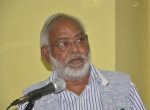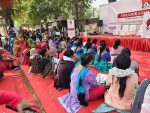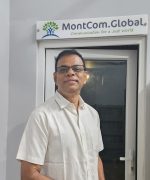By Santosh Digal
Cox’s Bazar, Bangladesh, Feb. 18, 2019: The Federation of Asian Bishops’ Conferences (FABC) has urged the international community to find a diplomatic solution to the on-going Rohingya refugee crisis.
This was expressed by Bishop Allwyn D’Silva, Executive Secretary of the Office of Human Development and Climate Change Desk, FABC on Feb 17.
More than 40 representatives of the Catholic Church from 11 countries in Asia visited Rohingya refugee camps at Cox’s Bazar, Chattogram, as part of their international conference on “Migrants, Refugees, the Displaced and Human Trafficking and Renewable Energy Options in the Asian Context.”
The Office of Human Development (OHD) of the FABC in collaboration with the Episcopal Commission for Justice and Peace of the Catholic Bishops’ Conference of Bangladesh (CBCB) and the Asia-Pacific Justice and Peace Workers Network (APJPWN) organised the international meeting from Feb 11 to 17 at Cox’s Bazar, Chattogram.
During the conference, the delegates had the opportunity to visit the displaced Rohingya people from Myanmar hosted in Kutupalong, Ukhia, Cox’s Bazar, Bangladesh.
They interacted with some Rohingya refugees at Cox’s Bazar listening to their issues, concerns and the plight.
The international community needs to have a united voice help Rohingya refugees and find an amicable solution to this crisis, said the auxiliary bishop of the Archdiocese of Bombay, India.
More than 740,000 Rohingya have fled to neighbouring Bangladesh amid violence in Rakhine state in 2016 and 2017. The displaced Rohingya in Bangladesh have expressed concerns about returning to Myanmar.
In spiritual unity with Pope Francis, who on 1 December 2017 met 16 representatives of the Rohingya community, we, too, were deeply moved by their stories and recalled what he said: “Let us not close our hearts, or look the other way. The presence of God, today, is also called Rohingya,” Bishop D’Silva recalled.
“From this visit, we recognized the welcoming attitude of the people and the government of Bangladesh who opened their doors and hearts to the Rohingya. We appreciate their cooperation with many people of good will in responding to the immediate needs of the displaced Rohingya. We also commend the generous and professional assistance being provided to the displaced Rohingya by the Catholic Church in Bangladesh through Caritas with the support of the global Caritas family, together with other faith-based organizations, UN agencies and NGOs,” Bishop D’Silva said in statement.
“We realise the constraints and hindrances of the temporary accommodation provided to the displaced Rohingya, as well as the challenges posed to the authorities in responding promptly and effectively to the humanitarian needs given the massive scale of the influx of people. We are particularly concerned about the vulnerability of many women and children and understand the numerous difficulties of the host communities,” he added.
The delegates share the vision of the international community on the Global Compact for Safe, Orderly and Regular Migration: “Migration has been part of the human experience throughout history.
“We recognize that it is a source of prosperity, innovation and sustainable development in our globalized world, and that these positive impacts can be optimized by improving migration governance” (No. 8). We reiterate the need for closer coordination and effective response to the challenges posed by contemporary migration and are reminded by the 4 verbs that Pope Francis encourages us with: to welcome, to protect, to promote and to integrate as “the efforts of all actors, among which, you may be assured will always be the Church.” (Pope Francis, Address to Participants in the International Forum on Migration and Peace, 21 February 2017),” said Bishop D’Silva, who has been deeply involved in human rights issues, social concerns and most recently environmental matters at the local, regional and national level.
The participants urged the world community to extend their solidarity to find an acceptable and adaptable solution to the countries concerned and thus to promote the integral human development of all.
They also gratefully acknowledged the cooperation of the government of Bangladesh for allowing the team to hold this seminar at Cox’s Bazar.
“We cannot but express deep solidarity with Rohingya refugees. The world community needs to act together to help them,” said Father Charles Irudayam, an Indian delegate.
The Catholic Church is closely working others for the cause of migrants, refugees, the displaced and effort to curb human trafficking and promotion of renewable energy options in Asia, said Father Irudayam, former secretary, Office for Justice, Peace and Development Catholic Bishops’ Conference of India.
Discussion on refugees and human trafficking situation were also dwelt with. The secretary and a staff from Migration and Refugees section of Vatican were also here and shared their inputs. This section is directly under Pope Francis who created this to show his concern towards migrants and refugees.
“Our personal visit and analysis of the situation was the goal and outcome of the conference and deliberate what the Church can do for this situation,” he said.










